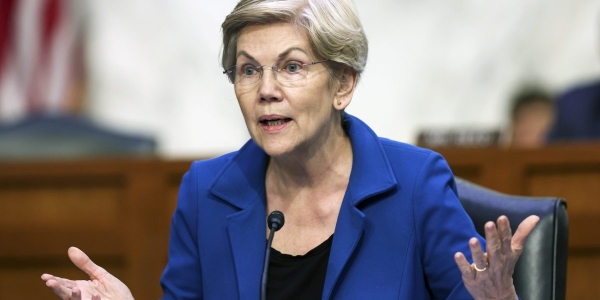
The collapse and subsequent rescue of regional bank First Republic mean JPMorgan Chase is now bigger.
Regulators seized First Republic on Monday and sold the majority of its assets to JPMorgan after customers worried about the struggling bank’s financial health withdrew more than $100 billion.
The collapse marked the third American bank failure since March and the second biggest in U.S. history.
The JPMorgan deal protects First Republic’s depositors—but concerns are circulating that shareholders face a wipeout.
However, Democratic Sen. Elizabeth Warren spoke out against the deal in an interview with CNN on Tuesday, voicing concerns that it had exacerbated the so-called Too Big to Fail problem in the banking sector.
The expression, a hangover from the 2008 financial crisis, refers to institutions that regulators would not allow to go bankrupt because of how deeply ingrained they are in the American financial system.
“What happened here is because a bank was under-regulated and started to fail, the federal government has helped JPMorgan Chase get even bigger,” Warren said on Tuesday.
“It may look good today while everything’s flying high, but ultimately if one of those giant banks, JPMorgan Chase, starts to stumble, the American taxpayers are the ones who will be on the line.”
A spokesperson for JPMorgan did not respond to Fortune’s request for comment.
However, the banking giant’s CEO, Jamie Dimon, has endorsed JPMorgan’s takeover of the troubled lender, noting that it was backed by authorities.
“Our government invited us and others to step up, and we did,” he said on Monday, before suggesting that the deal had injected some stability into the American financial sector.
“I think the banking system is very stable,” he added on a call to investors and analysts. “This part of the crisis is over.”
In a 2017 letter to shareholders, Dimon argued that “too big to fail” as a concept no longer existed, thanks to greater transparency, more regulations, and higher liquidity levels in post–financial crisis America.
“Essentially, ‘too big to fail’ has been solved—taxpayers will not pay if a bank fails,” he said at the time.
“The American public has the right to demand that if a major bank fails, they, as taxpayers, would not have to pay for it, and the failure wouldn’t unduly harm the U.S. economy. In my view, these demands have now both been met.”
In 2009, on the heels of the financial crisis, Dimon labeled “too big to fail” an “ethically bankrupt” policy and called for regulators to have the power to let large lenders collapse.
“If some unforeseen circumstance should put this firm at risk of collapse, I believe we should be allowed to fail,” he wrote in a Washington Post op-ed at the time.
Presidential seal of approval
While Warren raised concerns about JPMorgan absorbing First Republic, the deal has been given a stamp of approval from the government’s top office.
President Joe Biden said on Monday that the acquisition would ensure the banking system is “safe and sound”—and emphasized that taxpayers were not being put on the line.
“Let me be very clear, while all depositors are being protected, shareholders are losing their investments, and critically, taxpayers are not the ones that are on the hook,” he said at a news conference at the White House.
First Republic’s demise came after the failures of Silicon Valley Bank and Signature Bank, with the banks’ collapse hastened by the Federal Reserve raising interest rates, which dented the value of investments the lenders had made in assets like long-term bonds and left them with billions of dollars in unrealized losses.
Silicon Valley Bank was bought by North Carolina–based First Citizens Bank in the weeks following its failure, while Signature Bank was quickly taken over by New York Community Bancorp, parent company of Flagstar Bank.







